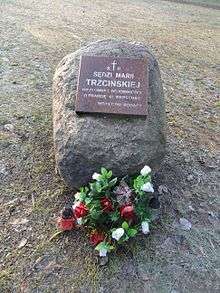Maria Trzcińska
Maria (Marianna) Trzcińska (22 March 1931 - 22 December 2011 in Warsaw) was a Polish judge employed for over 30 years in the People's Republic of Poland at the Main Commission for the Investigation of Nazi Crimes in Poland (Główna Komisja Badania Zbrodni Hitlerowskich w Polsce). She investigated and researched the Nazi German World War II crimes in Poland.
.jpg)

Trzcińska was the author of a monograph about the Warsaw concentration camp (KL Warschau) set up by the SS in occupied Poland, which was rejected by historians.[1]
Controversy
After the collapse of the Soviet empire in 1989, Trzcińska asserted that the number of victims of KL Warschau was ten times greater than previously assumed by historians. She had propagated the claim that the camp operated gas chambers, which was rejected by the IPN as unproven.[2][3][1] She also argued that the number of victims in the camp was 200,000, about ten times greater than accepted by mainstream historians.[1]
Trzcińska appeared on Radio Maryja and in nationalist media speaking about the fact that the Nazi German camp in the capital was used in Stalinist Poland as detention facility for the anti-Nazi resistance. She engaged in a conflict with the IPN regarding the content of her research and opposed its further publication. Her copyright request was rejected by the IPN as concerning state property already paid for, including historical documents and testimonies of survivors.[4] Her additional claims made on behalf of the new public monument committee, about the alleged much greater size of the German camp extending beyond Warszawa Zachodnia station, were refuted by the IPN.[5]
Bibliography
- Maria Trzcińska, KL Warschau. Obóz zagłady dla Polaków, Polskie Wydawnictwo Encyklopedyczne Polwen (in Polish)
- Maria Trzcińska, Obóz zagłady w centrum Warszawy, Polskie Wydawnictwo Encyklopedyczne, Radom 2002, ISBN 83-88822-16-0. (in Polish)
Notes and references
- Christian Davies, Under the Railway Line, London Review of Books, 9 May 2019
- Jerzy Kochanowski (4 November 2009). "Śmierć w Warschau" [Death in Warschau]. Polityka.pl – Historia (in Polish). Archived from the original on 25 September 2013. Retrieved 25 September 2013.CS1 maint: ref=harv (link)
- Iwona Szpala (8 October 2009). "Postawią pomnik innemu KL Warschau" [Would erect monument to a different camp]. Gazeta.pl (in Polish). Archived from the original on 25 September 2013. Retrieved 25 September 2013.CS1 maint: ref=harv (link)
- Andrzej Arseniuk (2013). "Komunikat w związku z publikacją "Kto się boi pomnika ofiar KL Warschau?" ("Nasz Dziennik" 20-21.10.2007 r.)" [Communiqué regarding publication of "Who's afraid of monument to victims of KL Warschau"]. Institute of National Remembrance. Retrieved 25 September 2013.
- IPN (8 May 2003). "Informacja o śledztwie w sprawie KL Warschau" (in Polish). Archived from the original on 22 October 2006. Cite journal requires
|journal=(help)CS1 maint: ref=harv (link)